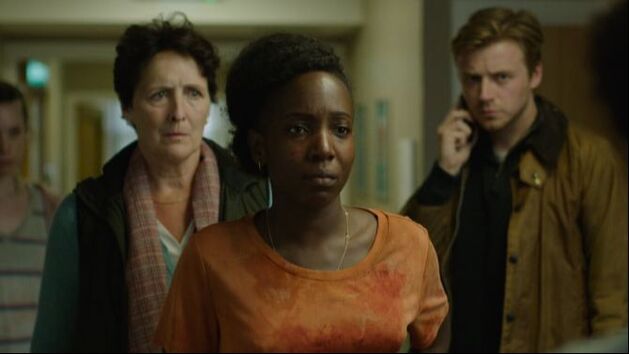[Review] 'Kindred' is Paranoid Pregnancy Horror that Explores the Mislabeling of Mental Illness11/4/2020  It is an unfortunate truth in the world of mental health that to be diagnosed with various types of psychoses means the diagnosis dominates the perspective of the doctors, family members, and strangers... ...Knowing someone possesses a mental illness, all their actions are said to reflect their disorder regardless if the diagnosis was correct or not. Mislabeling someone as “crazy” sullies most of their reactions and mannerisms because people expect the behaviors to reflect an unstable mind. In the case of Joe Marcantonio’s (Red Light) Kindred, the main character Charlotte (Tamara Lawrance) must battle extra hard against the stigma placed upon her because people believe she inherited her mother’s mental illness as her pregnancy pushes her closer to mental collapse. Loving couple Charlotte and Ben (Edward Holcroft) dote on each other and poke fun at Ben’s family members as they prepare to visit his mother Margaret (Fiona Shaw) and stepbrother Thomas (Jack Lowden) for lunch. The couple live in a modest flat with all the basic amenities, but Ben’s family lives in a lavish house with an endless amount of antiques and a creepy crow serving as a supernatural harbinger. The crow has a constant presence in the film; the symbolic bird appears to Charlotte while both awake and asleep, serving as a link to her nightmares and her quickly warping reality. While having a forced and awkward conversation with the mother of the house, the couple drops the bomb that they plan to move to Australia for a fresh start. However, the mother expresses her disdain for the topic with cries of anguish and feigning a sickness requiring her to lie down. The family has been living in the same house for nine generations and Margaret believes Ben holds an obligation to someday take it over, an inheritance he does not seem thrilled about. Charlotte pretends to get along with the family, and the promise of the move to Australia makes their regular visits more tolerable. However, the romantic plans of making a fresh start in a foreign country become a little more difficult when Charlotte learns of her pregnancy. She feels betrayed by her birth control, her past, and her body for putting her in such a situation. Her mother experienced perinatal psychosis while pregnant with Charlotte and never recovered, so Charlotte purposely avoided getting pregnant to prevent herself from experiencing the same madness. But Ben assures her she is not her mother, and they can still follow through with their plan to relocate. Ben’s mother, on the other hand, believes otherwise and insists the couple get married immediately and stay with her. The idea of being an unwed mother scandalizes Margaret and she becomes even more inconsolable when she learns they plan to take her grandchild to the other side of the world. The mother stresses her abandonment issues despite all the modern methods of staying in contact and eventually falls into a silent stare when faced with the idea of not getting her way. Unlike many mothers-to-be in pregnancy horror films, Charlotte hates the idea of becoming a mother and refers to her unborn child as an invading species which just feeds off her body, slowly growing and taking over her existence. Unintentionally, Charlotte’s description of pregnancy serves as a bit of foreshadowing for how Margaret will soon take over her life. Even more disheartening is that not long after revealing her pregnancy to a friend and the unsettling argument with Ben’s mother, Ben suddenly dies, leaving Charlotte alone. Her grief debilitates her for a while, and she awakens in the family home under the watchful eye of the creepy Thomas, a man who waits on Margaret day and night but never held a familial or friendly relationship with Ben in any way. Thomas appears cherubic and innocent, but his actions speak louder than his puppy-dog face. His late father married Margaret, then unexpectedly died, leaving Thomas to become a permanent fixture in the household. He obeys Margaret’s every word and does not express any kind of interest or goals outside of tending to the home and its matriarch. The overpowering dowager and ingratiating toady relationship between Lowden and Shaw’s characters complement each other well and they create a memorable and creepy duo. After Charlotte’s disorientating realization of her new life, Margaret attempts to make amends with her while they both grieve over the loss of Ben. However, part of Margaret’s healing process involves controlling Charlotte by cutting her off from anything outside of the family land including her home, her phone, and even her shoes. The conversations occur in large echoey rooms, intensifying Margaret’s sternness and Charlotte’s exasperation as her voice becomes lost within her surroundings. Every sigh, every gasp, and every footstep become audible in the vast and lonely house. To break up some of the silence, the film introduces a haunting string section as Charlotte wanders aimlessly with no home and no family. Only the ever watchful and controlling hand of Margaret. Plagued with headaches, dizzy spells, and even mysterious cuts, all of Charlotte’s ailments are explained away by Thomas and Margaret as symptoms of pregnancy. In fact, Kindred plays into a lot of the pregnancy horror tropes seen repeatedly in previous films. The woman slowly loses control over her life the more the baby grows, and the people around her dismiss any of her complaints or fears as simple pregnancy issues. The pregnancy becomes an illness and explains any symptom Charlotte might have, from her constant dizziness to her paranoia. The fear of loss of autonomy plays heavily in the film as Charlotte constantly serves as a connection to or part of someone else. In the beginning of the film, Margaret and Thomas only see Charlotte as her boyfriend’s accessory. Even Ben (who clearly loves her) admits he sees Charlotte as an extension of her mother, even though he argues she is “not her mother.” Once Charlotte becomes pregnant, the most important part of her is the baby; everything else is forgotten. The audience does not know anything about her past other than her mother suffered from lifelong mental issues. Aside from a couple hints that she used to play the piano, no real details about Charlotte are ever shared. So, even to the audience Charlotte does not exist much beyond the role of ‘pregnant woman’. Writers Marcantonio and Jason McColgan’s psychological pregnancy horror creates an atmospheric and claustrophobic setting of deceit, grief, and death, but the ending would have benefited from a female writer or perspective. Lawrance realistically conveys a loss of control as her physical movement becomes limited, but her mind and emotions also suffer as Margaret and Thomas strip away all of Charlotte’s identity. Projecting a psychosis onto Charlotte robs her of any freedom and she exists only as an incubator for the family’s new heir. Quite a few scenes will be reminiscent of Rosemary’s Baby or the more forgettable Hush (1998), but Kindred plays more into the issues of mental health, such that even the audience begins to question reality and illness. Kindred comes to select theaters, VOD and Digital from IFC Midnight on November 6th. By Amylou Ahava
0 Comments
Leave a Reply. |
Archives
March 2023
|


 RSS Feed
RSS Feed